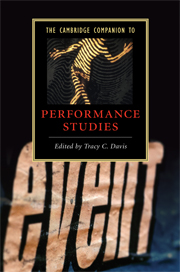Introduction: the pirouette, detour, revolution, deflection, deviation, tack, and yaw of the performative turn
Published online by Cambridge University Press: 28 January 2009
Summary
Since the 1970s, we have marked the “linguistic turn” (emphasizing language's role in constructing perception), the “cultural turn” (tracking the everyday meanings of culture, and culture's formative effect on identities), and more recently the “performative turn” (acknowledging how individual behavior derives from collective, even unconscious, influences and is manifest as observable behavior, both overt and quotidian, individual and collective). Each “turn” has its principal philosophical inspirations, holding in common an oppositional stance toward more “orthodox” approaches. The “turns” were executed not strictly successively but certainly interrelationally. In league with widely influential social movements - notably feminism and antihomophobia - and the related activist-academic fields of gender studies, queer studies, and cultural studies, the “turns” have had a momentous impact on the arts, humanities, and humanistic social sciences in the West and Western-influenced universities. As important as the performative turn has been to fields as diverse as anthropology and English - and other erstwhile improbable pairings, including neuropsychology and dance, ecological science and theatre - not everyone acknowledges that performance studies is a discipline in its own right. Is it constituent of all disciplines, an emergent discipline, or an already established discipline undergoing change? One common refrain is the lack of two-way interaction between adherents of performance studies and academics in other disciplines who claim performative territory, making use of the power of “performance” as an explanatory metaphor without regard for the implications of such claims, especially any “limits” to the performative.
- Type
- Chapter
- Information
- The Cambridge Companion to Performance Studies , pp. 1 - 8Publisher: Cambridge University PressPrint publication year: 2008
- 4
- Cited by



